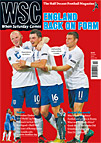 There's a very large reputation to live up to in Buenos Aires. Sam Kelly reports on the candidates to follow a national hero
There's a very large reputation to live up to in Buenos Aires. Sam Kelly reports on the candidates to follow a national hero
How do you find a replacement for God? It’s a question Argentines have been pondering since July 27, when it was confirmed by the Argentine Football Association (AFA) that Diego Maradona wouldn’t be offered a new contract as national team manager to replace the one that had expired four weeks earlier. The main candidates to step into the limelight were former Sheffield Utd and Leeds midfielder Alejandro Sabella, Diego Simeone and youth team coach Sergio Batista.
Batista, the simplest option due to being already employed by the AFA, was promoted temporarily for the two friendlies against the Republic of Ireland (the squad for which was picked by Carlos Bilardo) in Dublin and Spain in Buenos Aires. Once it became apparent that Simeone – still not proven as a manager, and with a habit of starting magnificently before his teams head steeply downhill – wasn’t really an option, the early favourite Sabella seemed set to get the job permanently in December, when the Torneo Apertura ends.
Sabella had signed a new, four-year contract with Estudiantes the week before Maradona met AFA president Julio Grondona in the encounter that brought about the end of his managerial reign. Sabella’s new contract, though, has a clause inserted specifically for these circumstances, stating he can leave if he’s offered the national team job.
As the club season got under way and the spotlight shifted from goings-on at the AFA, though, Batista has come to be talked about as the very comfortable favourite. Being the incumbent – even temporarily – has its advantages, and Grondona recently told a local radio show in Tucumán: “There will have to be some very big difficulties in order for Batista not to continue as Argentina manager.”
The match with Spain, in Buenos Aires on September 7 was seen as one potential source of difficulty for Batista, but a 4-1 victory with an impressive performance has only left him looking stronger than ever, friendly or not.
Sabella would have more than merited a crack at the job in his own right, had he been given the opportunity. Most of his coaching career has been as assistant to Daniel Passarella, thanks to which he already knows the national set-up from their time at France 98. Since stepping out of the shadows he’s enjoyed fantastic success with Estudiantes, winning last year’s Copa Libertadores after only six months in charge and keeping them very high up the Argentine league, a competition in which it’s notoriously difficult to achieve any kind of consistency even between consecutive half-seasons.
Batista, though, has the support of the players and, perhaps most crucially of all, that of Lionel Messi. Statements like “none of the players are thinking of him as a temporary boss” and “I enjoyed playing there [in the Republic of Ireland friendly] because it’s similar to my role at Barcelona” might sound fairly innocuous, but the Argentine media were quick to point out that Messi had never offered Maradona such support (the fact that he in fact did is of course forgotten).
Batista has a mixed CV to date; not having won any titles at club level, he led a team including Messi, Javier Mascherano and Juan Román Riquelme – self-exiled from the national team during Maradona’s tenure – to the Olympic title in Beijing, but also oversaw this January’s catastrophic Sudamericano Sub-20 campaign which saw the defending World Under-20 champions fail to qualify for this year’s tournament. There are doubts over his readiness to step up a level just yet, although he knows the current squad thoroughly and the recalls for Javier Zanetti and Esteban Cambiasso for the Spain match are only the most visible of the popular changes he’s made.
Argentina will host the Copa América in July 2011 and have several high-profile friendlies scheduled before then both at home and abroad, including two against Brazil, one of which will be in Buenos Aires. So the pressure will be on Batista to deliver if, as most now expect, he is handed the job on a permanent basis. His managerial record isn’t stellar but it is, at least, a huge improvement on his predecessor’s.
Working for the future has to be the aim of the game for the Argentine national side now, and Batista is the man looking most likely to start the ball rolling in the post-Maradona era.
From WSC 284 November 2010